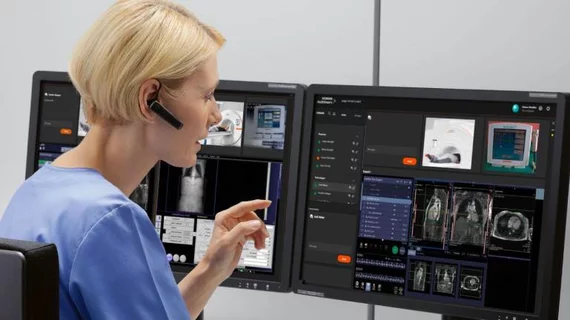Radiologic technologists are uncomfortable with managing imaging exams remotely
Most radiologic technologists are uncomfortable with the idea of managing imaging exams remotely, according to new survey data from the profession.
More than 71% of those polled have reservations about serving as the primary tech when working off-site. Another 75% do not believe that techs operating remotely—who specialize in certain modalities—can effectively train on-site techs who lack such certification.
The findings are derived from a survey of 7,816 members of the profession, conducted by the American Society of Radiologic Technologists in October.
“ASRT is still gathering data about remote scanning and working with other medical imaging organizations to determine how it can support this evolving imaging procedure,” CEO and Executive Director Melissa B. Pergola, EdD, said in a March 1 announcement. She adds that the association hopes to “ensure all technologists working with remote scanning are appropriately credentialed, educationally prepared and clinically competent for their specific role in the procedure.”
Despite concerns among techs, the practice is far from widespread. Only about 7% of respondents (561 RTs) said they work at healthcare systems that deploys remote imaging. Of those, 89% said their organization is using imaging professionals certified in the specific modality to manage the remote component of the procedure. Another 87% said such trained professionals are screening and positioning patients on-site for the procedure. And 82% said modality-trained personnel are administering contrast agents, where necessary.
About 97% of survey respondents believe remote technologists should be certified in the imaging modality they are handling, ASRT reported. And the same percentage also contend that on-site techs taking part in remote procedures should have the same training.
The association conducted the survey last year to gauge its members’ professional knowledge and beliefs around remote work. ASRT’s findings come as imaging providers seek creative ways to tackle rising procedure volumes amid shortages of trained professionals.
Technology vendors have responded to this interest, with Siemens Healthineers recently earning FDA clearance to market a “virtual cockpit,” which allows for remote scanning and support across up to three scanners. GE HealthCare also announced its own FDA OK in November for the company’s remote-scanning solution aimed at addressing staffing shortages. And Philips has touted its “Collaboration Live” capabilities for conducting ultrasound exams remotely.
Meanwhile, the American College of Radiology last month urged CMS to permanently allow remote supervision of diagnostic tests—a temporary perk granted during the pandemic. ACR also recently issued an updated statement, emphasizing that trained medical professionals should administer contrast media during remote exams.

